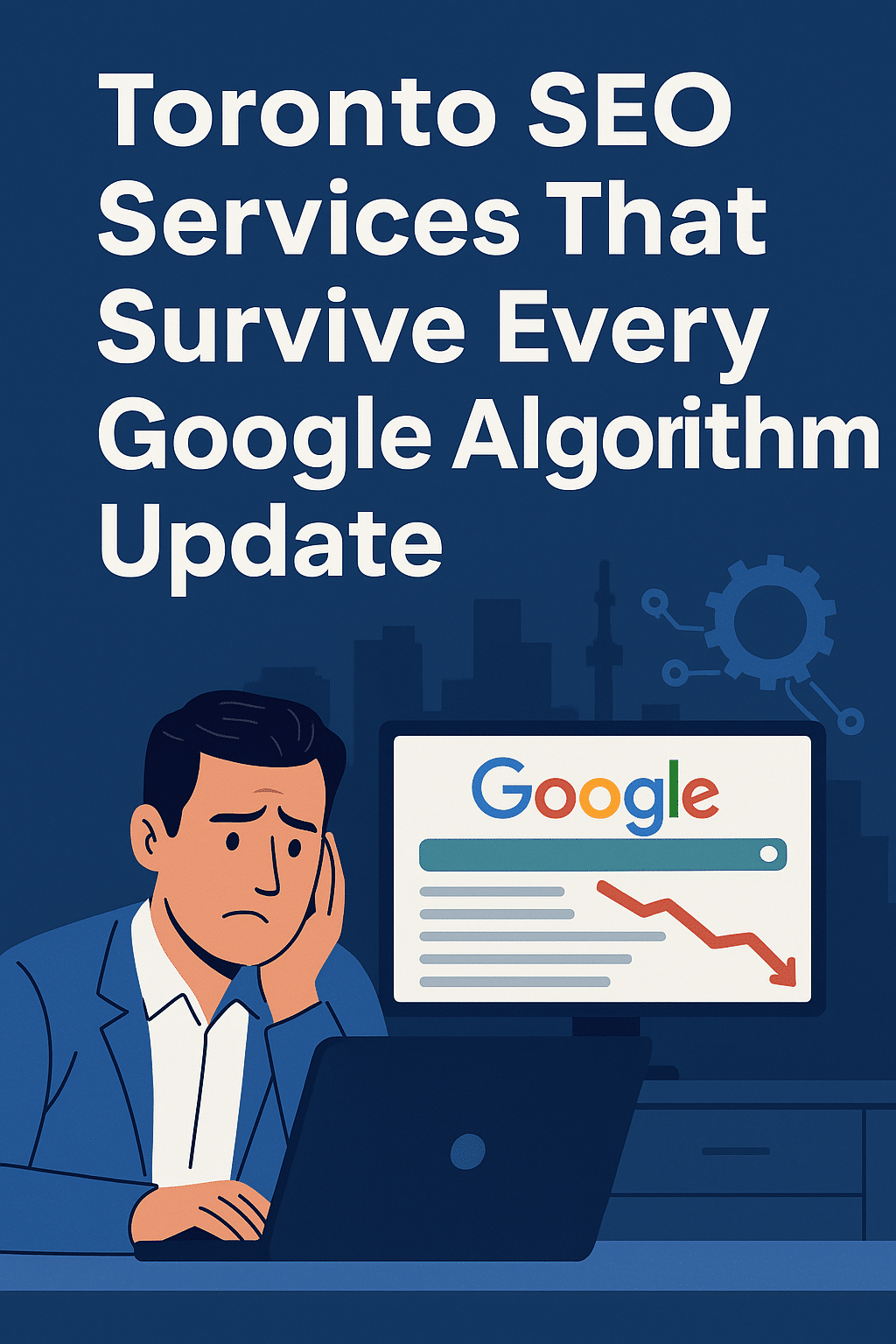Toronto SEO Services That Survive Every Google Algorithm Update

Every time a Toronto SEO Google Algorithm Update rolls out, hundreds of local businesses lose rankings overnight. The winners? They’re the ones with future-proof strategies that align with Google’s core principles: trust, expertise, and user-first content. If your SEO collapses after every update, it’s time to rethink everything.
Why SEO in Toronto Breaks After Every Google Update
Outdated Tactics Get Crushed
Most sites still rely on:
Keyword stuffing
Spammy link building
Thin content written for bots, not people
Google’s algorithm updates now reward real value, not manipulative hacks.
The New Ranking Signals Post-Update
Topical authority (not just keyword targeting)
E-E-A-T (Experience, Expertise, Authoritativeness, Trust)
UX metrics (site speed, mobile responsiveness, dwell time)
Intent matching (content aligned with real search queries)
If your Toronto SEO strategy isn’t built around those signals, your rankings won’t survive.
1. Build Topical Authority, Not Just Pages
To survive a Toronto SEO Google Algorithm Update, you need more than “optimized content.” You need content ecosystems.
Create Pillar Pages + Cluster Content
Instead of random blog posts, structure your content around core pillars like:
Toronto Local SEO
Google Maps Ranking Services
SEO for Real Estate, Law Firms, and Medical Clinics
Each pillar should be supported by 4–6 internal sub-articles covering long-tail and semantic keywords.
Use Semantic Terms, Not Just Exact Keywords
Google understands concepts. Use variations like:
“Toronto SEO algorithm recovery”
“Local SEO Google update strategy”
“How to fix Toronto rankings after core update”
This signals relevance even when keywords change.
2. Align With E-E-A-T Signals
E-E-A-T is a core ranking system behind every Google update.
Add Real Author Profiles
Pages should show:
Who wrote the content
Their qualifications
Proof of real-world expertise
This increases trust and aligns with Google’s quality guidelines.
List Your Business Everywhere
Citations strengthen your E-E-A-T and local visibility. Submit to:
Industry-specific directories
Use Schema Markup
Structured data like Organization, LocalBusiness, Article, and FAQPage help reinforce authority.
3. Focus on Long-Form, Evergreen, Intent-Based Content
Avoid Shallow Posts
Short, keyword-stuffed blogs don’t cut it. Every core update penalizes “unhelpful” content. Your pages should:
Solve problems
Be longer than 1200 words
Include visual hierarchy, lists, and structured flow
Update Your Top Pages Quarterly
Use Google Search Console to find declining pages and refresh them with:
Updated data
More examples
Better internal linking
Fresh headlines and intros
4. Invest in Technical SEO
Don’t wait for updates to fix site speed or crawl issues.
Optimize for Core Web Vitals (especially mobile)
Use fast, secure hosting
Compress images and lazy load below-the-fold content
Try tools like:
5. Own Local SEO — Especially Google Business
A proper Google Business Profile that’s optimized can outperform entire websites during local searches.
Add services + keywords to your GBP
Post weekly updates with location tags
Get more genuine reviews — they impact rankings post-update
Link to a full guide: Google Business Profile Optimization for Toronto SEO
Internal SEO Systems That Work in Toronto
These internal links should connect across your service pages and blog content:
Use anchor text that reinforces search intent.
Conclusion: Stay Ahead of Google — Or Get Left Behind
Every Toronto SEO Google Algorithm Update will expose weak strategies. If your content lacks value, your backlinks are artificial, or your technical SEO is broken — Google will know. The only way to survive is to commit to real, authority-building SEO that works long-term.
FAQs
What is a Google Algorithm Update?
Google updates its search algorithm frequently to improve the quality and relevance of search results. Core updates usually affect content rankings site-wide.
How often does Google update its algorithm?
Major core updates happen every 2–3 months, with smaller adjustments occurring daily.
Can you recover from a ranking drop?
Yes. By identifying what changed (content, links, UX), updating pages, and aligning with Google’s ranking signals, you can recover lost visibility.
Do backlinks still matter?
Yes—but only if they are relevant, earned, and contextual. Spammy or low-quality links will hurt you after core updates.


